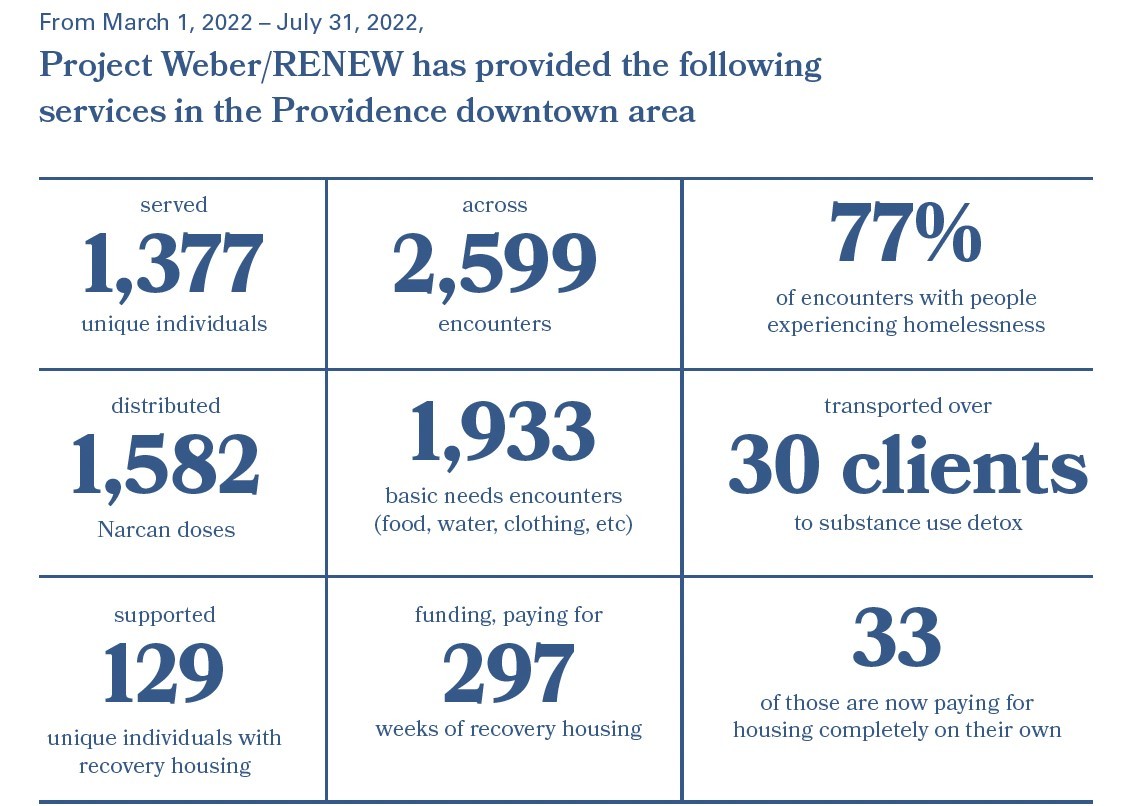
Grants & Scholarships
Help where it’s needed, when it’s needed
An innovative program is changing lives for some of Providence’s neediest people
Matt Elliott and Braulio Ortiz man a fold-up table in Kennedy Plaza. A regular stream of “customers” come and go. Do you need hygiene products? Narcan? Needles? Braulio makes a note of each visitor on his clipboard. Many are regulars. They stay and chat: where they’re staying, why they haven’t been around, how many weeks (or days) they’ve been clean. Virginia and her dog, Thor, stop by. She tells them she has an apartment now. Christina, who is living on a boat, asks Matt if he has any warm coats.
Matt is in recovery, so he’s dealt with many of the same issues as these folks. He grew up in Fox Point, but in high school, he fell in with a tough crowd and started drinking—and worse. He ended up going down a hard path. “For me, the tipping point was when fentanyl started showing up. Fortunately, I had a family and friends… structure around me to encourage me to get better, to get into detox.…”
Matt and Braulio work for Project Weber/RENEW—a partner in this collaborative homeless outreach initiative that is supported by the Rhode Island Foundation, Crossroads RI (CRI), The Providence Center (TPC), and the Downtown Improvement District Clean + Safe team (DID). This partnership provides behavioral healthcare, substance use treatment, and housing options for people experiencing homelessness who frequent Kennedy Plaza and the downtown area.

This effort was the brainchild of Senator Josh Miller, a downtown business owner for 25 years, chairman of the Downtown Improvement District (DID) and state senator since 2006. He knows that there are many people in and around downtown who are unhoused, challenged by mental health issues and addiction. He believed that the best way to support them was through a social work presence that incorporates as many different perspectives as possible. Josh made a proposal: the DID, in partnership with the Providence Foundation, would raise $200,000 toward the effort and the Rhode Island Foundation would supplement that amount with another $100,000.
“These are people who have always been in our footprint,” says Josh. “But efforts to address these problems have not always been collaborative. The DID team was not involved before, and yet, these guys know every nook and cranny downtown—they know who is sleeping where and, in many cases, they know their names.” So, the DID led the charge to raise funds for the program, and expanded their own Block By Block team by doubling the number of Safe Ambassadors on the streets (from five team members to ten), and by increasing their hours by adding four evening hours to their shift starting in November 2021.

The data so far suggests Josh was right: 41 households have been moved to permanent housing; 20 clients have been referred to the Coordinated Entry System Call Center* and four have entered shelters; while 16 referrals have been made to mental/behavioral health services. Crossroads Mobile Diversion Program, headed by Case Manager Will Blais, has made contact and begun working with 136 living-on-the-streets homeless clients. And finally, The Providence Center has created a fast-pass referral system for clients from Crossroads and Project Weber/ RENEW. So far, The Providence Center has received four referrals.

“People living on the street have often had negative experiences with housing, healthcare, and social service systems,” notes Colleen Daley Ndoye, executive director of Project Weber/ RENEW. The partners in this initiative are working to “rebuild the trust and streamline processes to determine more efficient, safe, and respectful ways to ensure that clients are returned to a stable living situation as quickly as possible.
”Back at Kennedy Plaza, Matt Elliott stresses the importance of having a highly visible presence downtown. “Our clients need to know that we are all available—every day. If someone had not been right there to take me to detox when I was ready, I don’t know what would have happened to me.”
*Coordinated Entry is a federal mandate that requires the state’s homeless service providers to integrate their efforts to make it easier for people to access services, identify and prioritize services based on need, and to make sure that people who need help the most get help first.



